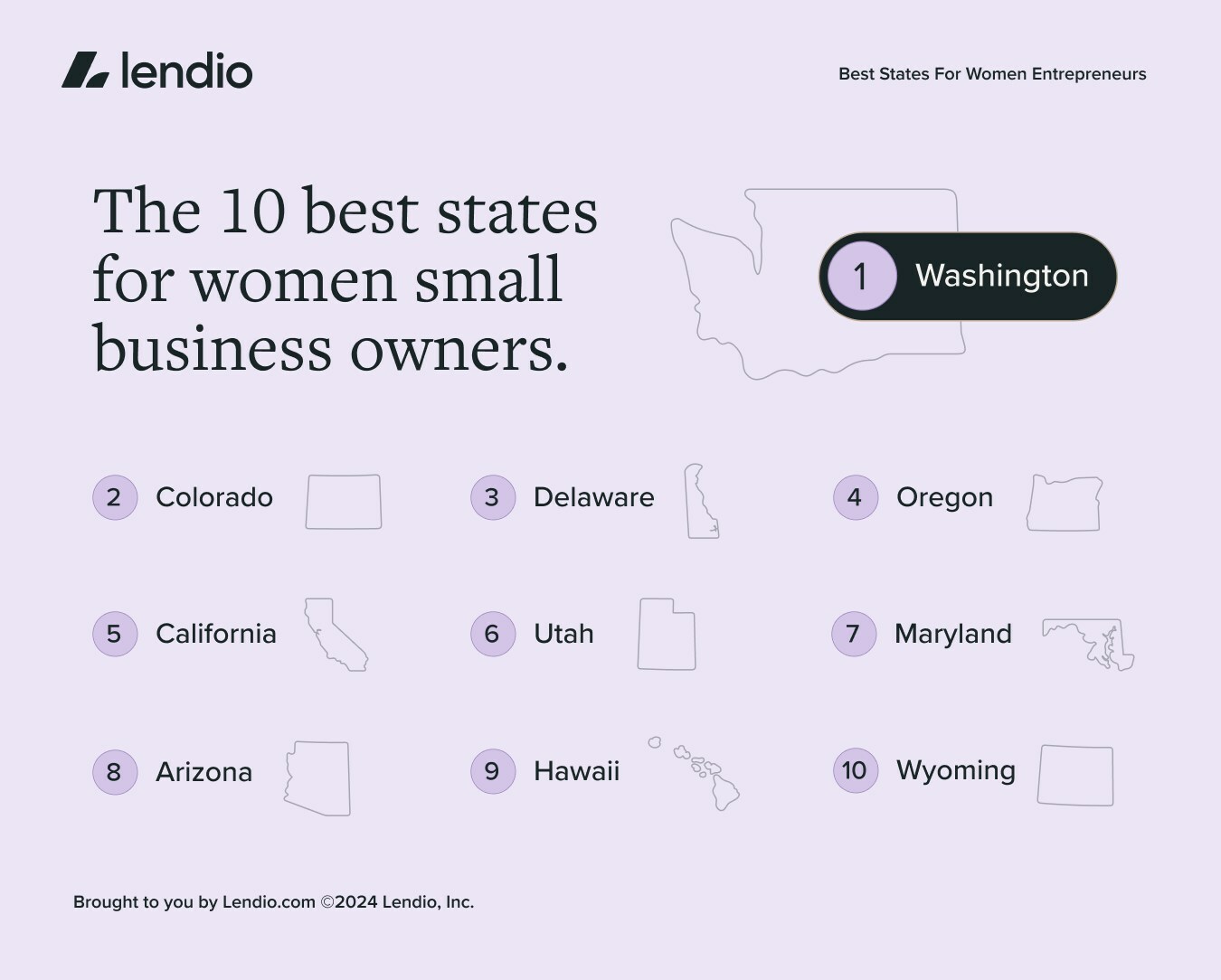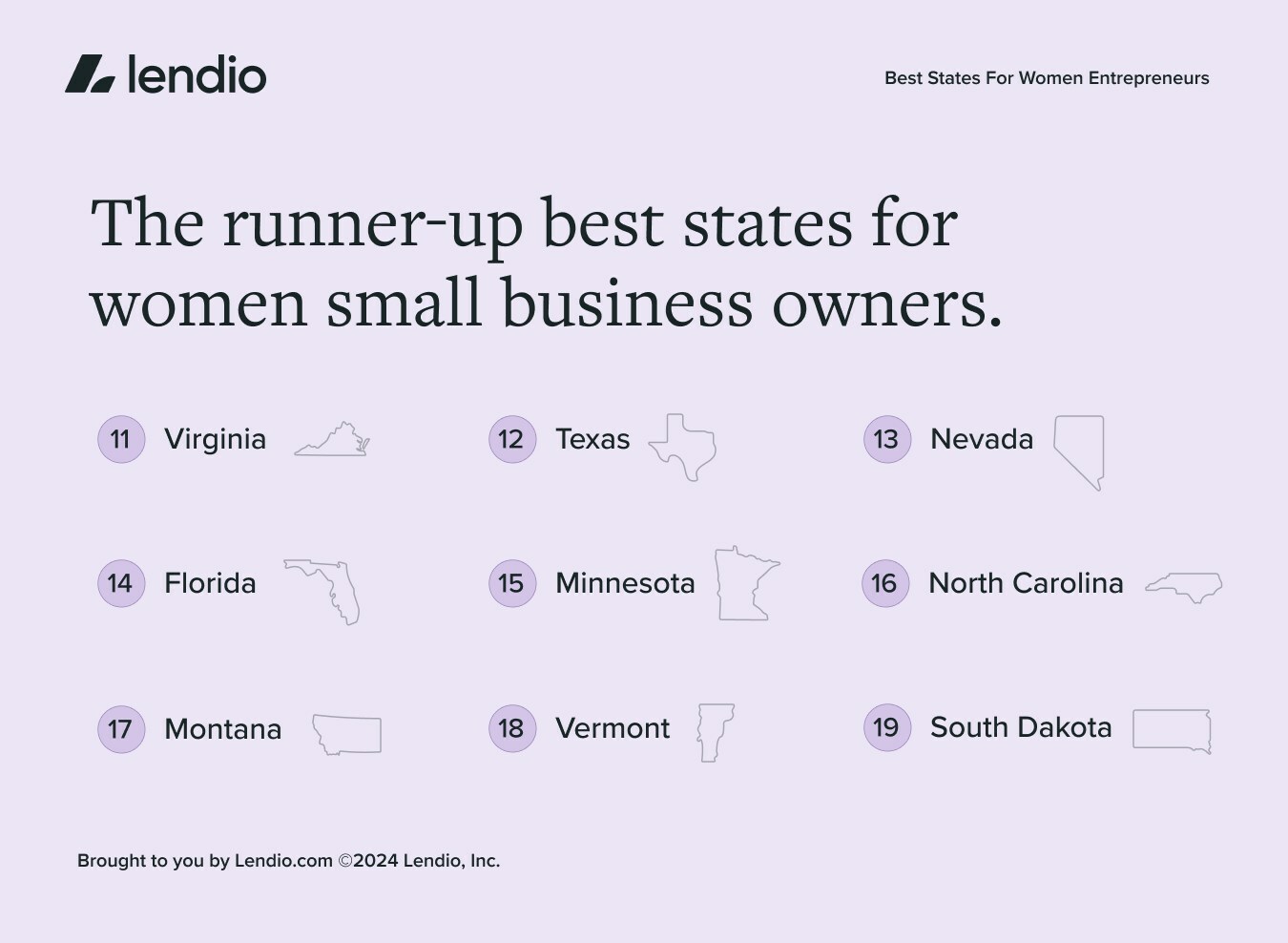Breaking News
Small Businesses
Empowerment in Business: Top States for Women-Owned Small Enterprises Revealed
Robert Tavares
March 19, 2024 - 12:29 pm

Empowering Women Entrepreneurs: The Best States for Female-Owned Small Businesses
In a recent tribute to Women's History Month, the nationwide small business loan resource Lendio has unveiled a comprehensive study spotlighting the leading states for female-owned small businesses. The findings reveal a distinct trend favoring the western region of the United States, with Washington and Colorado seizing the top two positions. Notably, Delaware and Maryland stand out as the only states east of the Mississippi to break into the top ten, signaling a more expansive opportunity landscape for women entrepreneurs across the country.
The report merges data from various authoritative sources, including the U.S. Census Bureau and the Bureau of Labor Statistics. A total of seven metrics were meticulously analyzed to gauge the most favorable environments for women-led enterprises. These included the proportion of employer businesses owned by women, the percentage of female-run businesses attaining revenue of $1 million or above, female patent filings, and the upswing in the number of women-owned small businesses.
The top ten list is a mix of seasoned and emerging hubs for female entrepreneurship: Washington, Colorado, Delaware, Oregon, California, Utah, Maryland, Arizona, Hawaii, and Wyoming. While Washington spearheads the ranking with a robust 42% of businesses owned by women, other states have also seen remarkable growth over the last decade. Florida's increase stands at a noteworthy 36%, closely followed by South Carolina's 30% surge in women-owned businesses. This growth is indicative of a broader trend that transcends state boundaries, highlighting the broad-spectrum rise of female entrepreneurship in America.
Brock Blake, CEO and Co-Founder of Lendio, comments on the significant economic contributions made by women entrepreneurs. The sector employs over 10 million workers and yields a staggering $3.9 trillion in revenue. Despite this, Blake acknowledges the hurdles that remain, particularly in capital access—a pivotal factor for any small business aiming to withstand economic shifts and flourish. In 2023, a mere 28.4% of dollars issued through SBA loans were granted to women. Blake emphasizes the necessity for enhancements in loan processing and underwriting technology to equalize the access to financial resources.
The full study is accessible on Lendio's website, providing an in-depth look at the findings and methodology behind the rankings. For those interested in delving further into the report, it offers a wealth of information that can guide women in making informed decisions about where to base and grow their businesses. The study represents a valuable resource for women entrepreneurs seeking to navigate the business landscape and align their strategies with favorable state-specific conditions. It strategically coincides with Women's History Month, underlining the importance and timeliness of such data in empowering female business ownership.
About Lendio
As a transformative force in small business lending, Lendio's innovative approach lies in its integrative technology platform that brings together small business owners, lenders, and service providers. The mission is clear: to create an ecosystem that bolsters the survival and prosperity of small businesses. With purpose-driven software developed for small business loan decisioning and underwriting, Lendio is at the forefront of facilitating capital flow. Their artificial intelligence applications match small businesses with optimal financing offers, while their comprehensive loan marketplace is seamlessly embedded within service providers' platforms. This synergy ensures that small businesses have streamlined access to the capital critical to their success.
Contact and Further Information
For media inquiries or further details regarding the study, parties interested can reach out to Christina Sanders at the contact number 3856020676 or via email at [email protected] This study, publicized by Lendio, provides noteworthy insights for businesses, policymakers, and organizations dedicated to advancing the landscape of women-led small business ventures across different states.
The full implications of Lendio's study extend beyond mere rankings. It offers a grounded perspective on the economic landscape facing women entrepreneurs and directs attention to the states that have cultivated an environment conducive to the growth and success of female-owned small businesses. These insights underscore the need for sustained efforts to address gaps in funding and support mechanisms, which continue to impose barriers on potential women entrepreneurs.
The Dynamics of State Performances
It is worthwhile to delve into the performance dynamics that placed Washington and Colorado at the pinnacle of the list. Factors such as a strong community backing, supportive state policies, and a vibrant entrepreneurial culture contribute to their status as ideal destinations for women-owned small businesses. On the other hand, Delaware's and Maryland's emergence among the top ten reflects the states' dedicated initiatives to nurture diverse and inclusive business environments—an aspiration that has evidently borne fruitful outcomes.
Several images accompanying the report provide visual encapsulation of the findings. The first illustration highlights the top ten states for women small business owners, offering a quick reference guide to the most favorable business climates. The runner-up states' depiction offers a broader view, encompassing a total of twenty states that exhibit considerable promise and growth potential for women-owned enterprises. These visual aids complement the report's written content, providing readers with intuitive and informative guides that further detail the state rankings.


The study meticulously accounts for aspects that venture beyond the direct ownership and profitability margins. One such aspect is the rate of innovation among businesses owned by women, as exemplified by the percentage of patents filed by female entrepreneurs. Innovation is a fundamental determinant of growth and competition, and thus, states that exhibit higher levels of female-driven innovation are recognized as more robust ecosystems for women-led startups and established businesses alike.
Equally crucial is the trajectory of growth in women-owned businesses within each state. Tides are changing, and states that have historically been overlooked are now witnessing a surge in female entrepreneurship. This shift not only speaks to the intrinsic determination and prowess among women in business but also to the increased availability of resources and networks that support their endeavors. It is the combination of these quantitative and qualitative factors that contribute to an overall assessment of the business environment, making the study a critical tool for decision-making and policy development.
Challenges and Opportunities Ahead
However, challenges persist, prominently highlighted by disparities in access to capital. Financial constraints heavily influence the launch, expansion, and sustainability of small businesses. The data showing that women received less than one-third of SBA loan dollars in 2023 offers a stark reminder of the financial barriers that still exist. Blake's call to action for improved loan processing and smarter underwriting technology resonates with a wider need for systemic change. There is a pressing requirement for lending practices to evolve, facilitating fairer access to funds for women entrepreneurs who have historically been underrepresented in business financing.
Yet, the encouraging trends observed suggest that there is forward momentum. Women are not only starting businesses in greater numbers but are increasingly breaking into industries and market segments that have been predominantly male-dominated. The scaling of women-owned businesses to reach revenue milestones, such as the $1 million mark, is indicative of the shattering of glass ceilings within the business world. It is in the steadfast growth of these statistics—a reflection of tangible success—that hope is fortified for a future of equal opportunities and recognition.
Lendio's documentation of these trends provides more than just an ephemeral snapshot; it is a testament to the progress and pitfalls that shape the current state of women's entrepreneurship. This ongoing narrative is a source of inspiration, motivation, and above all, a blueprint for action. It challenges stakeholders at every level, from individual business owners to the highest tiers of government, to consider how they can contribute to the upliftment and empowerment of women in business.
Concluding Remarks
The Lendio study on the best states for women-owned small businesses is a beacon that illumines the path forward. It celebrates the strides taken and signals the journey ahead—one marked by resilience, innovation, and boundless potential. In recognizing the states that lead the way, Lendio not only shines a light on the success stories but also on the collective effort required to foster equitable growth in the American entrepreneurial landscape.
For those with an entrepreneurial spirit, this study is more than a mere ranking—it serves as a narrative of ambition, a reflection of the evolution of the marketplace, and an invitation to dream bigger. As the nation continues to celebrate Women's History Month, the message is clear: women in business are not just making history; they are defining the future.
Contact Lendio for the comprehensive report and further information: Lendio's Study
SOURCE: Lendio
medical innovations news© 2025 All Rights Reserved




















